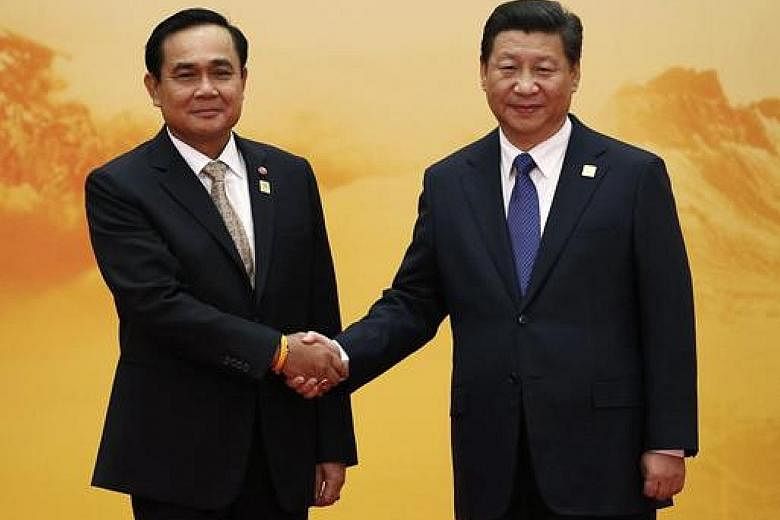Thai Premier Prayut Chan-o-cha has invoked a special law to push through the Sino-Thai railway project, as the kingdom strengthens its ties with Beijing.
In an order published on the Royal Gazette website on Thursday night, the junta chief used a constitutional clause, called Article 44, to waive the legal restrictions preventing Chinese engineers from working on this project.
The document also allows the Thai rail authority to bypass normal procurement procedures and hire a Chinese state enterprise to do detailed design work as well as construction consulting. Costing has to be completed in four months, it added. "This project has faced many obstacles, especially from legal limitations," it said, and special treatment was necessary "to deepen the bilateral relationship and bring great benefit to people".
The legal shortcut has raised hopes for the beleaguered Sino-Thai railway project, but also triggered concern over the possible neglect of safety, environmental and other related issues.
"It's a double-edged sword," Associate Professor Ruth Banomyong, who heads Thammasat Business School's Department of International Business, Logistics and Transport, told The Straits Times. "In Thailand, one of the reasons things take so long to execute is that we have a number of safeguards. If we use Article 44, it would mean that some of the safeguards will not be applied."
The Thai military government plans to build a fast railway link stretching over 800km from its industrialised eastern seaboard all the way up north in Nong Khai province bordering Laos. With Laos - sandwiched between the two nations - building its own cross-country high-speed rail using Chinese expertise, Thailand's future rail network is expected to connect to China.
But negotiations between China and Thailand have dragged on since 2014, when they signed a memorandum of understanding on rail cooperation. Both sides could not agree on financing arrangements, prompting General Prayut to declare last year that Thailand would pay for the first phase itself. This initial 250km route connects the capital to Nakhon Ratchasima province, a gateway to the country's populous north-east.
-
OBSTACLES IN SINO-THAI PROJECT
-
MARCH 2013: Government led by Ms Yingluck Shinawatra approves a Bill to borrow 2 trillion baht (S$122 billion) to fund infrastructure projects that will stretch up to 2020. Among these projects are mass transit networks, highways and a high-speed rail line stretching from Bangkok to Nong Khai, a province bordering Laos. It will eventually link up with China.
MARCH 2014: Constitutional Court rules that the government's Bill to borrow 2 trillion baht for its infrastructure projects is illegal.
MAY 2014: Military assumes control of Thailand after coup.
JULY 2014: Military government approves 741 billion baht budget to upgrade railways, including building a high-speed rail link between Thailand's industrialised eastern seaboard and Nong Khai.
DECEMBER 2014: Thailand and China sign memorandum of understanding on railway cooperation.
MARCH 2016: With Thai-Chinese negotiations held up over financial arrangements, Prime Minister Prayut Chan-o-cha announces that Thailand will fund the 250km Bangkok-to-Nakhon Ratchasima section on its own, but use Chinese technology.
SEPTEMBER 2016: Thailand and China agree that the Bangkok- to-Nakhon Ratchasima rail link will cost 179 billion baht.
JUNE 2017: General Prayut invokes a special constitutional clause, Article 44, that overrides legal hurdles to Chinese involvement in the project.
Asean's second-largest economy sits in a neighbourhood bearing growing Chinese influence. An oil pipeline running from Myanmar's west coast to China's Kunming recently started operating, while in Cambodia, China remains the largest source of aid and investment.
Analysts suggest political considerations figured considerably in Bangkok's latest decision. "This move by Prayut is being noticed by Washington and Tokyo, as it definitely tilts Thailand more towards China," said Dr Paul Chambers, a lecturer and special adviser on international affairs at Naresuan University.
In April, Bangkok approved a 36 billion baht (S$1.5 billion) purchase of three submarines from China. Last month, army chief Chalermchai Sitthisat said it planned to buy 34 armoured vehicles and another 11 VT-4 battle tanks from China.
According to latest World Bank figures, Thailand is set to keep last year's growth rate of 3.2 per cent this year. It is not clear how much effect this rail work could have on the overall climate. "It would be difficult to say if this is good or bad," said Tisco Economic Strategy Unit head economist Charnon Boonnuch. "But it will get things moving."


